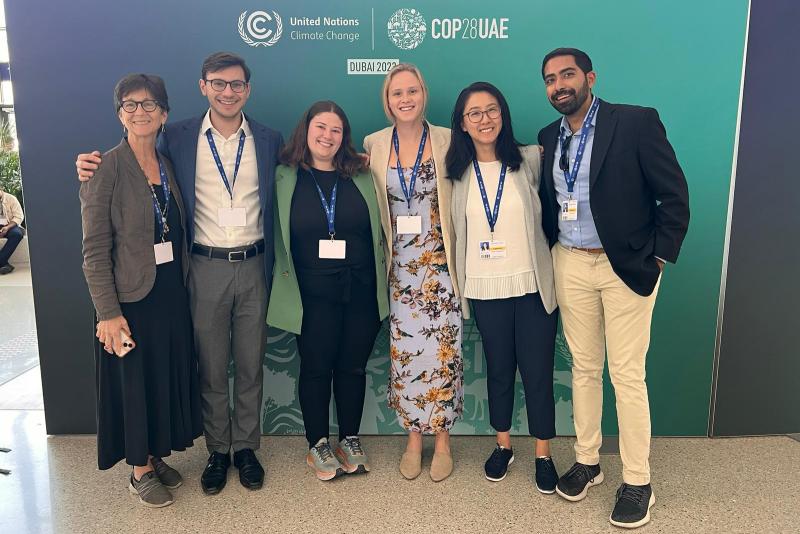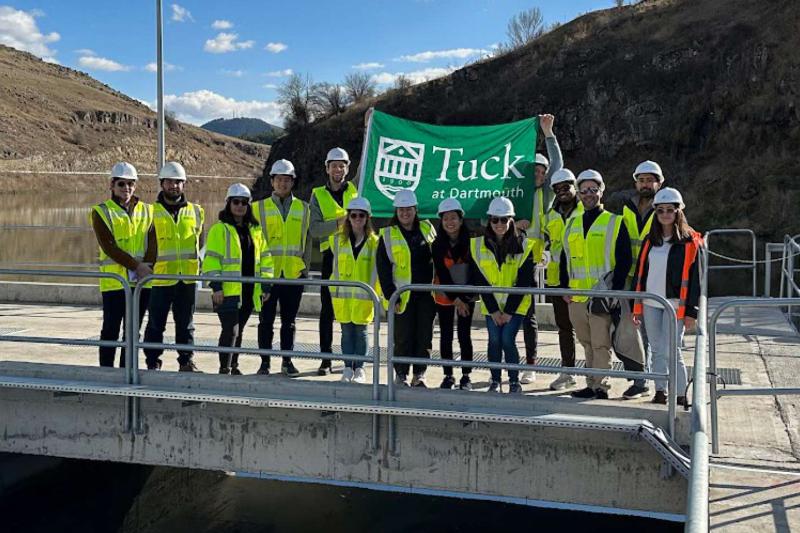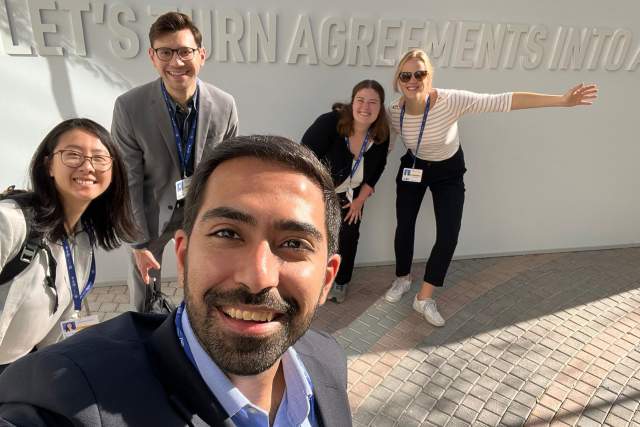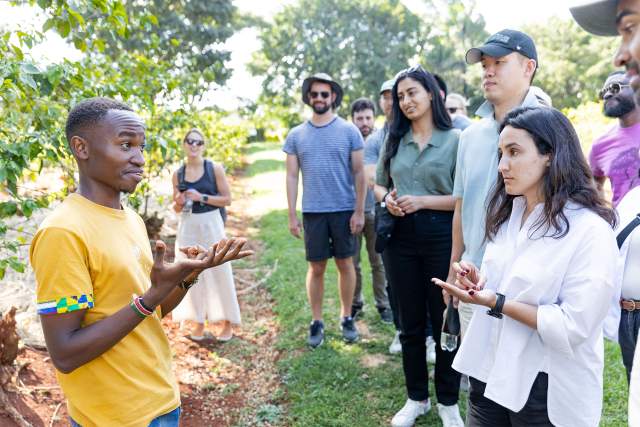Today, the impacts of climate change directly threaten nearly every major company’s assets. At the same time, the growing green economy offers trillions of dollars in economic opportunity. That means that for tomorrow’s business leaders, understanding energy and sustainability isn’t a “nice-to-have”—it’s a prerequisite.
“More and more students have realized how important energy, sustainability, and climate are,” explains Jonathan Silverthorne D’08, director of Tuck’s Revers Center for Energy, Sustainability & Innovation. “Many are passionate about these topics personally, and students also see that sustainability issues will be critically important to their careers.”
For Tuck students, the question now isn’t if they will engage with sustainability topics during their MBA—but where they will start.
Teaching Future Sustainability Leaders
Sustainability principles are integrated throughout the Tuck curriculum, but students can also push their learning further with specialized electives on topics ranging from energy finance to agriculture.
Current offerings include Business and Climate Change with Professor Anant Sundaram; Sustainable Marketing, taught by Adjunct Professor Liana L. Frey D’92, T’98; Current Issues in the Global Food Systems, led by Professor José Alvarez; Wicked Problems: Health, Wealth, and Sustainability, taught by Professors Ron Adner, Matt Garcia, Doug Irwin, and Lindsey Leininger; Energy Economics, taught by Professor Erin T. Mansur; and Financing the Clean Energy Economy with Adjunct Professor Curtis Probst; and the ESG Investment Practicum with Professors Ramon Lecuona Torras and William Martin.
Other courses, such as Corporate Responsibility, Impact Investing, and Social Entrepreneurship, address sustainability within the broader context of corporate responsibility and social impact.
Additionally, Tuck students often work with clients on Environmental, Sustainable, and Governance (ESG)-focused challenges during their First-Year Projects: recent examples include work to refine wind turbine manufacturing processes and size the market for carbon dioxide removals. And through Global Insight Expedition (GIX) courses, which in 2024 included Climate Innovation in South Africa and Sustainability in the French Agriculture Sector, students see how sustainability issues play out on a global scale.
More and more students have realized how important energy, sustainability, and climate are. Many are passionate about these topics personally, and they also see that sustainability issues will be critically important to their careers.
— Jonathan Silverthorne D’08, Director, Revers Center for Energy, Sustainability & Innovation
Centering Sustainability
Learning by doing is a core part of a Tuck education—and students interested in sustainability have countless opportunities to test what they learn in the classroom through hands-on projects, site visits, and more. The driving forces behind many of these experiences are two of Tuck’s six centers, the Revers Center for Energy, Sustainability, and Innovation and the Center for Business, Government, and Society (CBGS).
Today’s Revers Center dates back to 2012, when Dan Revers T’89 launched the Revers Energy Initiative at Tuck. With Dan’s support, the initiative was endowed as a full center in 2016 and now engages more than half of Tuck students each year. The center’s work is anchored in energy, while also covering broader topics and industries that intersect, including climate tech, mobility, decarbonization, and aspects of corporate sustainability. Within energy, student interests range across power, renewables, oil and gas, energy efficiency, and more.
CBGS, which Executive Director Hannah Payson says has existed “in various iterations” since 2000, advocates for a collaborative approach to global challenges that draws on the business, government, and nonprofit sectors. Its programming explores pathways to progress ranging from international treaty negotiations to alternate corporate structures and emphasizes the power of individuals to affect large-scale change.
In addition to collaborating with each other, the two centers also offer Tuck students a bridge to other sustainability resources and initiatives across campus, including the Arthur L. Irving Institute for Energy and Society, TuckLAB: Energy, and the Dartmouth Sustainability Office.
Broad—and Deep—Sustainability Education
The Revers Center and CBGS are open to students with every kind of sustainability background—or none. They regularly host panels with leaders in the field, lunch-and-learn sessions with industry alumni, and small-group workshops.
About a third of incoming students joined the Revers Center’s Energy 101 workshop last summer for a day-long dive into energy technology, systems, and markets, and the Trends in Energy Finance workshop that Jon Fouts T’92 leads is one of the most popular sessions each year.
While many of these events offer networking opportunities, others are more informal. The Revers Center’s Power-Up Thursday series, for example, invites students with industry backgrounds to give introductory-level presentations to their classmates. Recent topics include Nuclear Power 101, Carbon Markets, and Electric and Autonomous Vehicles.
“Tuck students come in with real-world experience,” says Silverthorne, “which means you can learn from your peers. Power-Up Thursdays are a chance for students who want to learn about the space to ask the basic questions they may not want to ask in front of the senior executives and potential employers we often bring to campus.”
The Centers also welcome all Tuck students on many of their off-sites, like the Revers Center’s recent tour of BETA Technologies’ next-generation electric aviation production facility in Burlington, Vermont. Last summer CBGS and the Tuck Center for Entrepreneurship brought first-year students to Portland, Maine, to explore the city’s marine sustainability startups.
At the other end of the spectrum, the centers’ fellowship programs offer the most committed students leadership opportunities on campus and beyond, support for ambitious research projects, and alumni mentorship. At CBGS, Business, Government & Society fellows lead seminars and research projects on pressing global issues, while Nonprofit Board fellows take up seats on local organizations’ boards to help guide their work. Revers fellows lead sustainability-related programming on campus, conduct research, and advise New England businesses on their sustainability strategy.
“We aim to help students take what they’re learning in the classroom as well as what they’re learning through cocurricular programming like workshops and apply it in a sustained, programmatic way,” says CBGS Executive Director Hannah Payson.

Over the past 15 years, Tuck has consistently sent a delegation of MBA students to attend the United Nations Climate Change Conference, also known as the Conference of Parties (COP).
Joining the Global Conversation
Both CBGS and the Revers Center also look far beyond Hanover. For the last 15 years, they’ve sent a Tuck delegation to the annual United Nations Climate Change Conference, better known as COP, as part of a specialized sprint course. Participating students have credentialed observer status at the conference, allowing them to access everything from startup presentations to high-stakes negotiations.
Conversations about how developing countries can adapt to climate change were particularly salient for Lauren Adamson T’24, who attended COP28 in Dubai.
“Typically, COP has been more focused on climate change mitigation—which is important, but we know that climate change is happening,” she says. “This year, there were more conversations around adaptation and about who should be responsible for helping developing countries.”
Adamson, a Revers fellow who previously worked in private equity in Mongolia, also played a major role in organizing the 2024 edition of the Revers Center’s annual fellows Trek, which gives participants a chance to explore energy issues in unique ecosystems. This year, the fellows went to Georgia, where they learned how the post-Soviet state, which just a few decades ago experienced frequent blackouts, liberalized its energy market.
When computers were first rolled out, only people in specific roles used them. Then, they became part of everyone’s job. The same thing is happening with sustainability.
— Lauren Adamson T’24
“Eighty percent of Georgia’s electricity now comes from hydropower,” Adamson explains, “which has reduced their reliance on neighbors like Russia. We chose Georgia because we wanted to explore energy security issues as well as hydropower systems and financing.” While in Georgia, the fellows met with senior government leaders who shared in-depth insights into how the country’s grid operates, discussed pressing energy issues with industry leaders, private equity investors, and officials from the US Embassy and USAID, and toured a hydropower plant.
For Adamson, both international experiences—as well as courses like Financing the Clean Energy Economy, and an internship at Colorado’s Clean Energy Fund—reinforced her belief that sustainability literacy is critical in every sector.
“As my friend Jack Vann T’24 pointed out, when computers were first rolled out, only people in specific roles used them,” she says. “Then, they became part of everyone’s job. The same thing is happening with sustainability.” That’s why, she notes, she’s focusing on impact, rather than industry, in her job search.
In fall 2024, students will have another chance to share that perspective at a global level thanks to Tuck’s recent appointment as a network partner for the Business 20 (B20), a group that bridges the business community and the G20 summit of major economies. The partnership, organized through CBGS, will allow the center’s fellows to join calls with the B20’s Trade and Investment Task Force and develop programming related to its recommendations.
“Sustainability is woven throughout the B20’s goals,” says Payson. “They’re working to promote inclusive growth while combating hunger, poverty, and inequalities and accelerating the net zero transition.”

This year Revers Center fellows visited the country of Georgia where they explored how the post-Soviet state, which just a few decades ago experienced frequent blackouts, liberalized its energy market.
Helping Students Chase Ideas and Passions
Beyond their own programming, CBGS and the Revers Center provide resources, space, and support for student clubs, including Tuck Sustains, the Tuck Energy Club, Net Impact, the ESG Fund, the Food & Sustainable Agriculture Club, and more.
“Centers are designed around the student experience,” says Silverthorne. “That allows us to be agile and responsive to their interests, as well as to market changes in the rapidly evolving energy and sustainability fields. Each year, students play a key role in shaping and leading the Revers Center’s programs.”
One of the most ambitious student-run projects is the million-dollar Tuck Social Venture Fund (TSVF), which second-year student directors run with support from Tuck faculty, the Center for Business, Government, and Society, and the Dartmouth Investment Office. The fund offers seed investments (typically $10,000 to $50,000) to early-stage for-profit companies that deliver measurable social impact and financial returns.
For TSVF director Claire Kadeethum T’24, an engineer who previously worked in the Canadian oil sands, the fund has offered a pathway into a field she first discovered when she took Impact Investing: Capital for Social Impact with Professor Curt Welling D’71, T’77, who also advises the TSVF. Within the fund, Kadeethum assesses climate tech ventures, an experience that has opened her eyes to the complex calculus impact investors have to perform.
One thing that fascinates me is the concept of differentiated impact. I came to Tuck assuming that any climate tech company is an impact investment, but Curt Welling reminded us that that is not the case.
— Claire Kadeethum T’24
“One thing that fascinates me is the concept of differentiated impact,” Kadeethum explained. “I came to Tuck assuming that any climate tech company is an impact investment, but Curt [Welling] reminded us that that is not the case. Investing in a technology that removes less emissions than a competing technology means you are not necessarily making a positive impact.” After graduation, Kadeethum—who is also a Revers Center Fellow, Director of the Tuck Student Initiative for Decarbonization, and Co-Chair of Tuck Sustains—will apply that perspective to an energy-focused role at Bain & Company.
Demand from entrepreneurially minded students also inspired the Revers Center’s Renewable Energy Finance Case Competition, which invites teams to present pitches to alumni judges who hold senior roles in the energy industry. And when a group approached the center’s leaders about starting a podcast, “yes” came quickly. Today, the student-led Tuck Energy Currents podcast explores career paths, current sustainability-related issues affecting business, and more, with guests including industry leaders and recent Tuck graduates working in the field.
Bringing a Green Focus to Every Industry
It’s clear that Tuck students care deeply about sustainability—but why do they choose an MBA over a degree explicitly focused on energy or climate policy? For Adamson, the answer is simple: the public sector can’t tackle the climate challenge alone.
“The private sector is good at getting things done—and going forward, even roles that aren’t obviously about sustainability will have those considerations,” she said. “If an operations leader decides to invest in solar for a manufacturing facility, that has huge energy impacts. Making those decisions over and over again will be how we achieve the green transition, and an MBA from Tuck offers the tools to be part of that process.
This story originally appeared in print in the summer 2024 issue of Tuck Today magazine.

